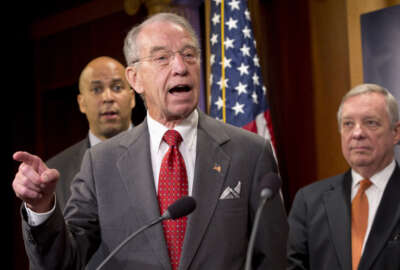
New Senate bill creates stricter administrative leave options
A new bill from Sens. Chuck Grassley (R-Iowa) and Jon Tester (D-Mont.) defines the term "administrative leave" and creates new categories of leave for employees...
In attempt to clarify widespread ambiguity, a new bill from Sens. Chuck Grassley (R-Iowa) and Jon Tester (D-Mont.) would limit the time federal employees can spend on administrative leave — and prompt agencies to finish their investigations into employee misconduct or poor performance more quickly.
The Administrative Leave Act puts a five-day limit on employees for excused absences or authorized paid leave. It also creates new categories — called investigative or notice leave — for employees who are under investigation or awaiting an adverse action and need to be out of the office.
Sens. Ron Johnson (R-Wisc.) and Tom Carper (D-Del.) co-sponsored the bill.
“Paying government employees to stay at home not only robs taxpayers of millions of dollars each year, it allows agencies to drag their feet in taking disciplinary action,” said Johnson, chairman of the Senate Homeland Security and Governmental Affairs Committee, in a statement. “This bill forces government agencies to complete timely investigations and make fair decisions, and it mandates real accountability and transparency to Congress.”
Agencies spent a total of $3.1 billion on paid administrative leave between fiscal 2011-2013, according to a 2014 Government Accountability Office study, and agencies’ interpretation and use of existing administrative leave authorities varies widely.
These new categories are separate from existing directives and require a multi-step process for the agency.
First, agencies would have to determine what threat — if any— the employee might pose to other employees, government property and interests, and whether having the employee in the office would jeopardize evidence or an ongoing investigation.
Next, agencies will have to consider other options, such as reassigning the employee to other work, letting the employee telework or take some other kind of leave.
After considering all of those options, agencies can place the employee on up to 10 days of investigative leave. An agency leader would have to approve any further extensions.
Chief human capital officers, with input from the investigator on the employee’s case, would have to approve extensions of 30 days each, totaling no more than 120 days of investigative leave.
According to a summary of the bill, “120 days of leave comprises approximately six months of time for an agency to conduct an investigation before further approval requirements are mandated. [It] requires guidance on designations by the chief human capital officer and on best practices for consultations with IG investigators.”
Agencies can ask for further extensions of up to 60 days each, pending approval from OPM. Agency leaders must report the extensions to appropriate congressional committees.
The legislation also requires that agencies explain to employees why they’re being put on investigative or notice leave.
The Office of Personnel Management would have more requirements too. The bill asks for official OPM guidance on the new processes, as well as a study on the agencies that grant administrative leave for more than five days.
Ultimately, the bill is an attempt to crack down on a “crutch for management to avoid making tough personnel decisions,” Grassley said.
Seventeen agencies spent $80.6 million in 2014 to place employees on paid administrative leave for a month or longer, according to a report from Grassley’s office.
The report, which Grassley released in November, details administrative leave practices for 18 agencies.
The Veterans Affairs and Homeland Security departments spent the most of any other agencies, roughly $23 million and $20 million, respectively, on administrative leave for one month or more in 2014, the report said.
As many as 87 DHS employees stayed on administrative leave for a year or more in 2014, the report said. The VA had 46 employees on leave during the same time frame.
Both the House and Senate VA committees berated the agency’s leaders for the sluggish pace in which they’ve issued punishments to numerous employees involved in misconduct.
Frustrated with the time its inspector general took to investigate agency employees, the VA began conducting its own personnel investigations separate from the IG, the department’s Deputy Secretary Sloan Gibson told Congress in December.
So far, the legislation earned endorsements from the Senior Executives Association and Federal Managers Association.
The SEA praised the “meticulous determination” the sponsors used to craft the legislation.
“Senators Tester and Grassley, and their diligent staff, have taken the time to understand this issue, informed by a Government Accountability Office and a staff report,” SEA President Tim Dirks said in a statement. “Moreover, during the course of over a year, they have actively engaged SEA and other stakeholders from all sides in the crafting of this targeted, fair and thoughtful legislation.”
House Oversight and Government Reform Committee Chairman Jason Chaffetz (R-Utah) attempted to introduce a bill of a similar name earlier this month, but the committee had “significant concerns” and withdrew the legislation.
Copyright © 2024 Federal News Network. All rights reserved. This website is not intended for users located within the European Economic Area.
Nicole Ogrysko is a reporter for Federal News Network focusing on the federal workforce and federal pay and benefits.
Follow @nogryskoWFED





